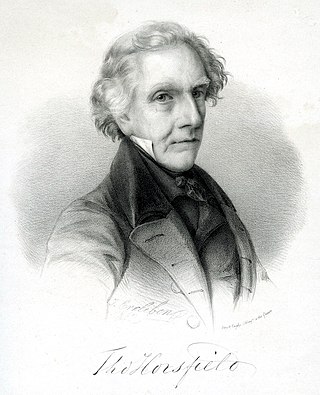
Thomas Horsfield was an American physician and naturalist who worked extensively in Indonesia, describing numerous species of plants and animals from the region. He was later a curator of the East India Company Museum in London.
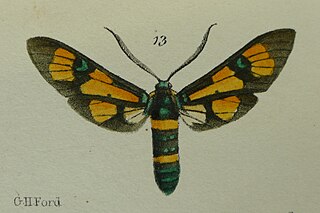
Euchromia horsfieldi is a species of moth in the subfamily Arctiinae first described by Frederic Moore in 1859. It is found on Java, Sumatra, Borneo, the Lesser Sunda Islands and Christmas Island.
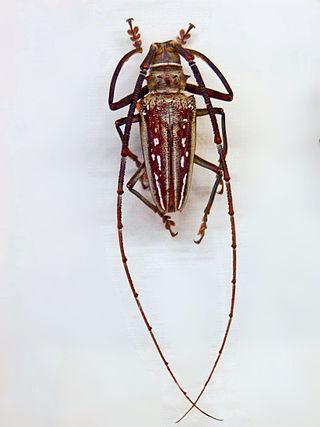
Batocera wallacei, common name Wallace's long-horn beetle, is a species of flat-faced longhorn beetle in the subfamily Lamiinae of the family Cerambycidae. The species name honors Alfred Russel Wallace, who discovered this longhorn beetle on the Aru Islands in Indonesia. It was named after him by James Thomson in 1858.

Batocera laena is a species of flat-faced longhorn beetle in the subfamily Lamiinae of the family Cerambycidae.

Lineopalpa horsfieldi is a species of moth of the family Erebidae first described by Achille Guenée in 1852. It is found in the Himalayas, Sumatra, Java, Borneo, Luzon, Sulawesi, Seram and New Guinea.

Batocera maculata is a species of flat-faced longhorn beetle in the subfamily Lamiinae of the family Cerambycidae. While originally named as "Lamia tigris" by Voet in 1778, no name was validly published for this species until 1817; Voet's 1778 work fails to fulfill the requirement in ICZN Article 11.4 that a work must be consistently binomial, and all names within that work are unavailable.
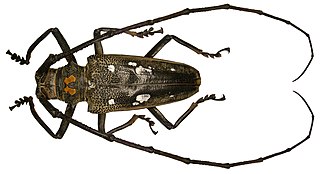
Batocera celebiana is a species of beetle in the family Cerambycidae. It was described by Thomson in 1858. It is known from Java, the Moluccas, and Sulawesi. It contains the subspecies Batocera celebiana pierrotae.
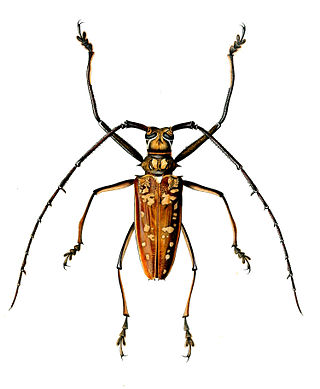
Batocera victoriana is a species of beetle in the family Cerambycidae. It was described by Thomson in 1856. It is known from Borneo, India, Laos, the Philippines, Malaysia, Vietnam, and Sumatra. It contains the varietas Batocera victoriana var. velleda.
Batocera forbesii is a species of beetle in the family Cerambycidae. It was described by Waterhouse in 1881. It is known from Sumatra.
Batocera frenchi is a species of beetle in the family Cerambycidae. It was described by Van de Poll in 1886. It is known from Australia. Batocera frenchi is one of the species which caused the cane toad to be brought into Australia in June 1935.
Batocera inconspicua is a species of beetle in the family Cerambycidae. It was described by Van de Poll in 1890. It is known from New Guinea and the Solomon Islands. The species measures between 49 and 63 millimeters. It contains the varietas Batocera inconspicua var. germanica.

Batocera lamondi is a species of beetle in the family Cerambycidae. It was described by Rigout in 1987. It is known from the Solomon Islands.

Batocera lineolata is a species of beetle in the family Cerambycidae. It was described by Louis Alexandre Auguste Chevrolat in 1852. It is known from China, Korea, Japan and Taiwan.
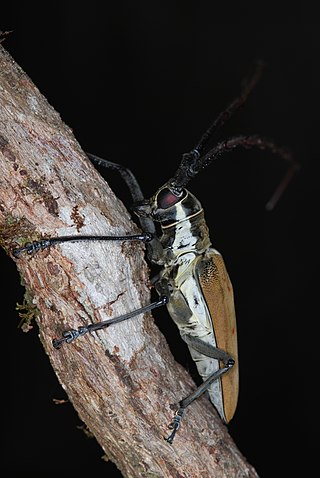
Batocera numitor, the mango-tree longicorn borer, is a species of beetle in the family Cerambycidae. It was described by Newman in 1842. It is known from China, Java, India, Laos, Nepal, Myanmar, the Philippines, Sulawesi, Sri Lanka, Thailand, Sumatra, and Vietnam. It feeds on plants including Mangifera indica and Quercus griffithii.
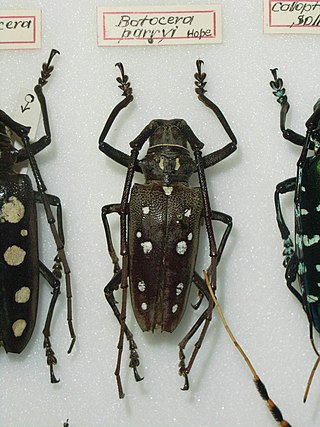
Batocera parryi is a species of beetle in the family Cerambycidae. It was described by Hope in 1845. It is known from China, India, Laos, Java, Myanmar, Malaysia, Sumatra, and Vietnam.

Batocera rubus is a species of beetle in the family Cerambycidae. It was described by Carl Linnaeus in his landmark 1758 10th edition of Systema Naturae. It is known from Japan, China, Java, India, Laos, Myanmar, Malaysia, the Philippines, South Korea, Taiwan, Sumatra, Thailand, and Vietnam. It feeds on Ficus carica, Ficus elastica, and Mangifera indica.

Batocera rufomaculata is a species of long-horn beetle in the family Cerambycidae. It was described by Charles De Geer in 1775. It is known from China, Israel, India, Jordan, Lebanon, Laos, Mauritius, Malaysia, Madagascar, Myanmar, Puerto Rico, Pakistan, Réunion, Syria, Sri Lanka, Thailand, Barbados, Bangladesh and the Virgin Islands.
Batocera armata is a species of flat-faced longhorn beetle in the subfamily Lamiinae of the family Cerambycidae. While originally named as "Cerambyx thomae" by Voet in 1778, no name was validly published for this species until 1800; Voet's 1778 work fails to fulfill the requirement in ICZN Article 11.4 that a work must be consistently binomial, and all names within that work are unavailable.














